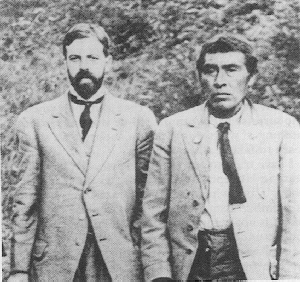The camp was the last refuge of the Yahi Indians. It was home to perhaps a half-dozen Indians, including the man who would come to be known as Ishi after he was taken into the modern world nearly three years later in Oroville.
The discovery of the village was said to have been met with amazement that "stone age" Indians could have survived, undiscovered, into the 20th century.
The fact is, the tribe was not still living in the stone age, and their presence was known to the ranchers who were their neighbors in the canyon, although the village site hadn't been located.
But the general population regarded the tales of "wild Indians" in the neighborhood about the way Big Foot sightings are viewed today.
At least that was the case until November of 1908.


1 comment:
Re: California Indians
In 1848, before the Gold Rush in California, that state's Native population is estimated to have been 150,000. In 1870, after the Gold Rush, approximately 31,000 were still alive. Over 60 percent of the indigenous people died from diseases introduced by hundreds of thousands of so-called "49ers."
California tribes were also systematically chased off their lands, force-marched to missions and reservations, enslaved, tortured and brutally massacred.
By this time period in California, the price paid for a Native scalp had dropped to around $0.25, as opposed to 100 English pounds in the early to mid-1700s in the Eastern U.S.
Jack Forbes, a Native historian, wrote:
"The bulk of California's Indians were conquered, and died, in innumerable little episodes rather than in large campaigns. It serves to indict not a group of cruel leaders, or a few squads of rough soldiers, but in effect, an entire people; for ...the conquest of the Native Californian was above all else a popular mass enterprise."
Post a Comment